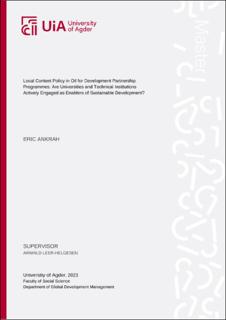| dc.description.abstract | Local content policy designed in the Oil for Development partnership programme between Ghana and Norway was crucial to promote the use of Ghanaian local expertise, goods and services, people, businesses and financing in the oil and gas activities. The “local expertise” and “people” components of the policy are equally crucial to the overall success of the policy goals. Institutions of higher learning, technical institutions, and vocational institutions are responsible for developing the “local expertise” and training the “people” to fulfill the requisite knowledge and skill needs of the oil and gas industry. Thus, the participation of these educational institutions in the local content policy processes is essential to both the development of the policy and the overall sustainability of the oil and gas resources.
The purpose of this study was to investigate the engagement and contributions of universities and technical institutions in the local content policy of the Oil for Development partnership programme between Ghana and Norway. Qualitative method by use of questionnaire was employed to elicit responses from five purposively selected categories of respondents. The categories of respondents were made up of universities, technical institutions, government agencies, private organizations, and a civil society organization. The thirteen received responses revealed that while some universities and technical institutions are engaged in local content policy process in the OfD partnership programme, the form of engagements do not allow for significant contributions. Notwithstanding, continuous efforts are made by these educational institutions to engage, be engaged, and contribute.
In terms of efforts made by universities and technical institutions to contribute to local content policy development in the oil and gas industry, some universities and technical institutions have engaged relevant government agencies for policy discussions pertaining to oil and gas activities in Ghana. Additionally, some universities and technical institutions have established partnerships with industry players and other key stakeholders in oil and gas that allow for practical training and internships for students and knowledge transfer and sharing among university lecturers, instructors, and professors.
As an indication to curriculum development by universities and technical institutions, new study programmes and professional courses relevant to the petroleum industry and sustainable development of natural resources have also been developed at certificate, bachelor, master’s, and PhD levels. | |
